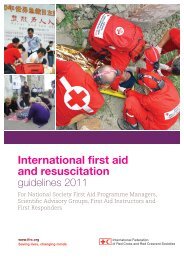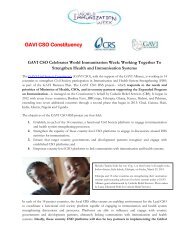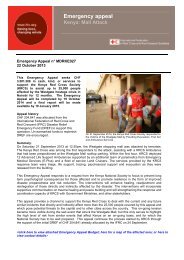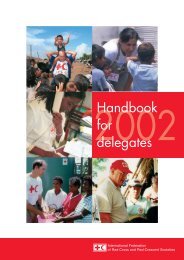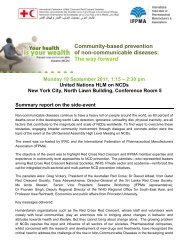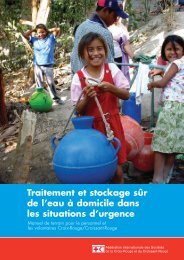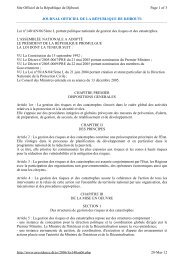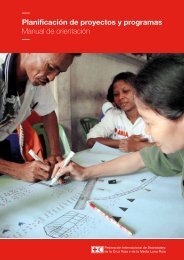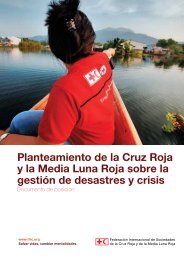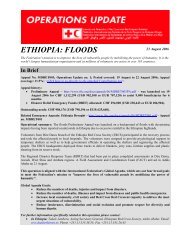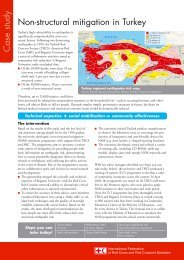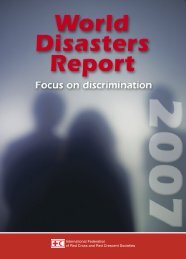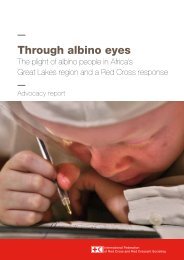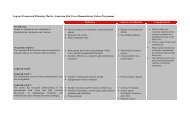World Disasters Report 2010 - International Federation of Red Cross ...
World Disasters Report 2010 - International Federation of Red Cross ...
World Disasters Report 2010 - International Federation of Red Cross ...
Create successful ePaper yourself
Turn your PDF publications into a flip-book with our unique Google optimized e-Paper software.
ownership or other formalized/legal rights to<br />
reside at a given location) <strong>of</strong>ten bear the brunt<br />
<strong>of</strong> natural disasters and resultant displacement<br />
and damage to property. However, on the<br />
whole, post-disaster HLP policy tends to provide<br />
clearly preferential treatment to formal property<br />
owners, <strong>of</strong>ten to the detriment <strong>of</strong> the rights <strong>of</strong><br />
those within the informal or customary sectors,<br />
thus raising questions <strong>of</strong> equity and rights.<br />
Structural landlessness and homelessness.<br />
Even though pre-disaster landless<br />
and homeless families constitute one <strong>of</strong> the<br />
most vulnerable groups affected by disaster,<br />
these families are frequently excluded or at best<br />
marginalized in relief and recovery processes.<br />
This group can include informal occupants or<br />
squatters on public or private land who are<br />
unable to return to their homes, such as people<br />
living in a coastal buffer zone in post-tsunami<br />
Sri Lanka. They can also be pre-disaster tenants<br />
who were not allowed to return to their<br />
former homes and lands or households headed<br />
by women who were not permitted to purchase<br />
property or not on the same terms as men. In<br />
post-tsunami Aceh, more than 15,000 land<br />
parcels (7,000 hectares) were irretrievably<br />
damaged, with resettlement on public land as<br />
the only available option. Following the 2005<br />
Pakistan earthquake, the failure <strong>of</strong> the authorities<br />
to provide housing assistance to the landless<br />
was identified as a major reason for longterm<br />
displacement and the prolonged existence<br />
<strong>of</strong> temporary shelter settlements.<br />
Land grabbing and illegal/unfair<br />
land acquisition. The unjust acquisition <strong>of</strong><br />
land following a disaster can have a detrimental<br />
impact both on the people whose land is literally<br />
stolen and on humanitarian agencies engaged<br />
in shelter activities. Land grabbing can<br />
take a variety <strong>of</strong> forms ranging from outright<br />
violence (by both public and private actors),<br />
to carefully orchestrated legislative measures<br />
designed to achieve outcomes in the aftermath<br />
<strong>of</strong> disaster that would have been politically infeasible<br />
had the disaster itself not taken place.<br />
Following Hurricane Katrina in New Orleans,<br />
public <strong>of</strong>ficials attempted to undertake a range<br />
<strong>of</strong> planning and zoning measures during the<br />
reconstruction process, which had the actual<br />
effect <strong>of</strong> significantly changing land use and<br />
land and housing ownership patterns – in other<br />
words, a land grab.<br />
Restitution or resettlement? According<br />
to relevant international standards, such<br />
as the United Nations Principles on Housing<br />
and Property Restitution for Refugees and<br />
Displaced Persons (2005), there is, when<br />
conditions so permit, a presumption <strong>of</strong> restitution<br />
and an emerging right to return to one’s<br />
original home for displaced people following<br />
both disaster and conflict. In many instances,<br />
however, restitution can be blocked due to HLP<br />
disputes over a land plot or dwelling, real or<br />
attempted land grabs, the secondary occupation<br />
<strong>of</strong> homes and lands and various other common<br />
post-disaster situations. In post-tsunami<br />
Thailand, HLP restitution rights for communities<br />
living on land informally were secured through<br />
the resolution <strong>of</strong> many HLP disputes by a special<br />
land sub-commission, but in many cases,<br />
the technically extralegal or informal tenure<br />
status held by disaster victims can greatly affect<br />
their rights in post-disaster settings.<br />
Proving who has which HLP rights.<br />
Following the Pisco earthquake in Peru, shelter<br />
programming was affected due to the difficulties<br />
in clarifying the existence <strong>of</strong> property titles<br />
for the land potential beneficiaries were occupying.<br />
The international community developed<br />
procedures to select reconstruction beneficiaries,<br />
which procedures rely on vulnerability criteria<br />
(i.e., the elderly, disabled people, children<br />
and others) and on criteria related to the tenure<br />
<strong>of</strong> the land and properties built on it.<br />
<strong>World</strong> <strong>Disasters</strong> <strong>Report</strong> <strong>2010</strong> – Focus on urban risk<br />
65



